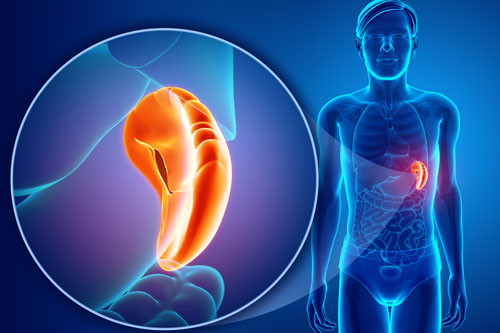I recently heard a teleconference on mitochondrial DNA, which got me to thinking about a study I had read years ago and the subsequent article I wrote comparing the spleen in Traditional Chinese Medicine (TCM) with that in Western medicine. Because both directly relate to the mitochondria, I am including a very shortened version of this here. (Students coming to the seminar this next week will find it particularly useful for their studies and review!)
A combined Western medicine/TCM study that was done in China yielded surprising results in the connection between the spleen in both medicines. In the study, a tiny camera was introduced into the mucosal lining of the stomach in both normal patients and those with the TCM symptoms of deficient Spleen Qi (the organ name will be captilized when referring to its broader TCM function so as to differentiate it from the purely physiological Western organ).
The symptoms of deficient Spleen Qi include: poor digestion, low appetite, gas, bloatedness, acid regurgitation, loose stools, undigested food in the stools, malnutrition, weakness in arms and legs, fatigue, poor muscle development, edema of abdomen, hips and thighs, blood spots under the skin, easy bruising, lack of sensation of taste, prolapsed organs, frequent bleeding, abdominal distension, obsession, worry, and anemia.
The results of the study showed a marked correlation between the quantity and quality of mitochondria in the normal patients versus those with deficient Spleen Qi (keep in mind here that the mitochondria are the “power houses” of the cells, which thus relate to Qi, or “energy,” in the body).
In the normal patients, the mitochondria were abundant in number while in those with deficient Spleen Qi, the mitochondria were not only fewer in quantity, but the ones present were damaged, swollen and/or had poor reticulation. This affected many aspects of the body, such as poor digestion, decreased hemoglobin levels and reduced muscle strength.
The deficient Spleen Qi patients in the study experienced abdominal flatulence, abnormal stools and undigested food in the stool after intake of a high protein diet. All of them had an obvious quantitative and qualitative changes of their mitochondria and displayed a decreased number of the enzyme secreting cells (zymogen granules) necessary for normal digestion. A deficiency of Spleen Qi was thus found to correspond to an insufficiency of digestive enzymes and a reduction of enzyme activity, interfering with digestion of proteins.
There are many more correlations between the functions of the spleen in TCM and that in Western Medicine, but it’ll have to wait for a full article, or a book Michael and I have talked about writing for over a decade on comparing the two medicines. This here is meant to just give you a taste and hopefully, inspire you to explore the comparisons between the two medicines on your own.
In the meantime, there are herbs which tonify Spleen Qi and they may well increase the number, improve the function and correct the damage and malformation of the cells’ mitochondria. This is good news. Readily available and well known, they include: ginseng, dioscorea (Chinese wild yam) codonopsis, astragalus and jujube dates.

